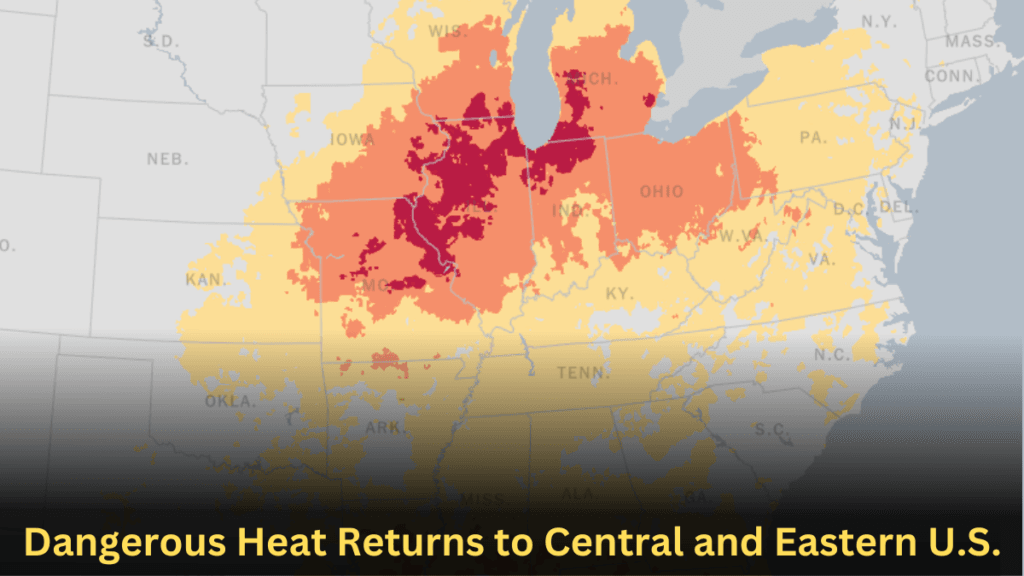Forecasters Warn of Scorching Temperatures
The heat advisory is back, as dangerous temperatures and humidity are on tap to sweep across the central and eastern United States this week. High heat could make it feel like a blistering 115 degrees Fahrenheit in some areas, marking an extreme departure from recent fall-like weather.
Extreme Heat Grips the Midwest
The meteorologists have given a heat advisory to the Midwest as temperatures are supposed to shoot up. Cities like Columbus, Ohio, and Chicago may experience 95-degree highs. This is out-of-season sweltering hot and could set records; in some areas, this might just be the hottest days of summer.
Mid-Atlantic and Southeast Next in Line
By midweek, the heat advisory spans as far eastward as the Mid-Atlantic, and southward through the Southeast, Washington, D.C., is expected to top a scalding 100 degrees on Wednesday. And Louisville, Kentucky may top out at 99 degrees on both Wednesday and Thursday.
Netflix’s Pop Star Academy KATSEYE – Unveiling the Secrets to Forming a Global Girl Group in 2024
Nighttime Relief Unlikely
Overnight lows will offer little relief in those areas under a heat advisory where temperatures are not expected to dip below the 70s in the Central and Southern states. That does continue the threat for heat related illnesses.
Excessive Heat Warnings in Effect
An extreme heat advisory has been issued at parts of eastern Iowa, with a heat index that will surpass 100 degrees. Forecasters emphasize that such conditions are not only uncomfortable but could be life-threatening, especially to sensitive groups.
Reminders in an Excessive Heat Advisory
- Hydrate: Drink plenty of water throughout the day to keep your body hydrated.
Limit Outdoors Activities: Whenever possible, stay inside during the hottest hours of the day, between 10 a.m. and 4 p.m. Utilize Ventilation with Fans and Air Conditioning: Stay cool by using fans or air conditioning, if available, while spending time in public cooling spaces that are air-conditioned, such as libraries or malls.
Midwest Heat Advisory Affects Over 13 Million
As of Monday, over 13 million in the Midwest are under a heat advisory. The city of Eau Claire, Wisconsin, is seeing temperatures in the 90s. This compares to Eau Claire’s normal highs, during late August, of 79 degrees.
Cold Front Expected After Heat Wave
A cold front will move in, bringing relief after the expiration date of the heat advisory. This front will be cooler with temperatures settling down, thus ending the extreme heat wave by the end of the week.
Record-Breaking Heat Continues in the South
Of course, the Midwest and East Coast don’t have a corner on the heat advisory. Amarillo, Texas set a record when it recorded over 100 degrees for the 10th consecutive day. Phoenix, Ariz also set its record with its 91st consecutive day with a temperature of 100 degrees or over.
Heat-Related Deaths on the Rise
Again, the National Weather Service has continued to advise following heat advisory guidelines. This is a public health concern because thousands of Americans die every year due to diseases brought on by the heat.
Precautions must be taken due to the existing heat advisory. In case someone is well-informed, well-hydrated, and cool, then this can prevent heat-related illnesses and be safe during such extreme heatwaves.
Expert Tips on Prevention Of Excessive Heat
Following are seven tips from the experts on how to cope with excessive heat:
1. Keep Your Body Hydrated
Drink water at regular intervals throughout the day, even if you do not feel thirsty. Do not drink alcohol, caffeine, and those sugary drinks, which can cause dehydration. If you want, you can drink some electrolyte-heavy beverages to keep the hydration levels up during extreme heat.
2. Limit Your Outdoor Activities
Try to stay indoors during peak heat hours, usually between 10 a.m. and 4 p.m. If you have to be outside, take breaks often in the shade or go inside, and wear light-colored, loose-fitting clothes.
3. Use Air Conditioning
Stay in air-conditioned spaces as much as possible. If your home doesn’t have air conditioning, go to public places such as a mall, a library, or a cooling center for relief from the heat.
4. Seek Sunscreen and Protection in Clothing
Apply broad-spectrum sunscreen with at least SPF 30, and reapply every two hours when you are outdoors. Wear a wide-brimmed hat, sunglasses, and loose-fitting clothes to reduce direct exposure to the sun’s rays.
5. Heat-Related Illnesses
Watch for heat exhaustion or heat stroke, which can be manifested by dizziness, nausea, rapid heartbeat, and confusion. Move to a cooler location and apply cool compresses if you or your partner starts developing symptoms. Seek immediate medical attention.
6. Adjust Your Diet
Eat lighter, smaller meals during very hot weather. Avoid heavy meals and hot foods; both can raise your body temperature. Fresh fruits and vegetables with high water content, like watermelon and cucumbers, can help contribute to your overall hydration.
7. Check on Vulnerable Individuals
Older adults, young children, and people with chronic health conditions are more at risk for heat-related illnesses. Check on neighbors, friends, and relatives who might be vulnerable during a heat wave to ensure that they stay cool and get plenty of fluids.

